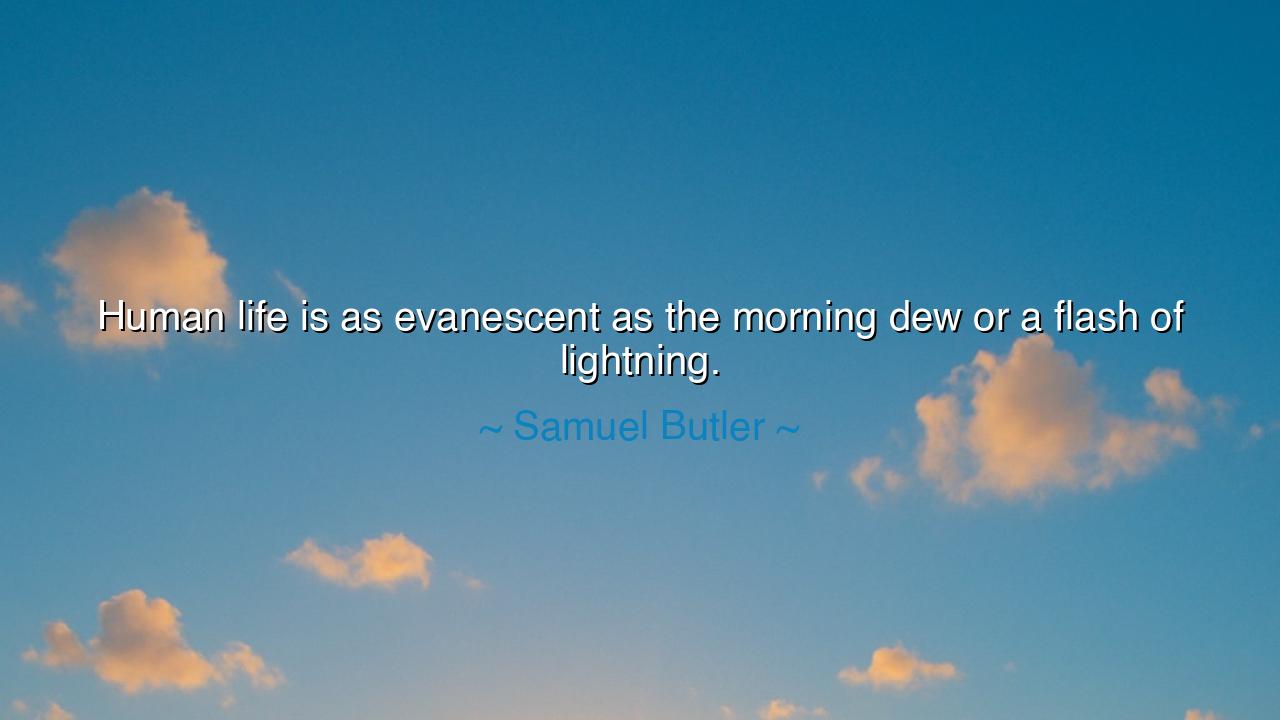
Human life is as evanescent as the morning dew or a flash of






Samuel Butler, in saying, “Human life is as evanescent as the morning dew or a flash of lightning,” speaks with the voice of the ancients, reminding us of the fleeting nature of existence. His words echo like a bell across centuries, telling us that life, though precious, is but a moment suspended between dawn and dusk. The dew glistens at sunrise yet vanishes with the rising sun; the lightning rends the sky in majesty, only to fade into darkness. So too is the life of man—brilliant, beautiful, and heartbreakingly brief.
The ancients often turned to nature to grasp the truths of mortality. The morning dew, fragile and delicate, mirrors the innocence of youth, shining brightly but disappearing before the world has fully awakened. The flash of lightning, sudden and fierce, reflects the vigor of human passion, a burst of power that illuminates the heavens yet leaves no lasting trace. Butler’s comparison is not meant to sadden, but to awaken us: in the shortness of life lies its sacredness. To waste even a moment is to squander what was given in rarity and fragility.
History bears witness to this truth. Consider Alexander the Great, who at thirty-two had conquered much of the known world, yet perished young, his empire unraveling after his death. His life was a flash of lightning—a brilliance that dazzled the earth, but was gone too soon. Contrast this with the quiet figure of Anne Frank, whose short life, like morning dew, was extinguished early by cruelty, yet whose words have endured across generations. In both, we see the evanescence of life, yet also the enduring mark a soul may leave even in the briefest of spans.
This teaching runs deep in the philosophies of East and West. The Stoics of Rome would say, Memento mori—remember that you must die, and thus live wisely. The Buddhists of Asia compared life to a bubble upon the stream, shimmering in beauty before it bursts. Butler’s imagery stands in harmony with these traditions, reminding us that to live as though time were endless is to live foolishly. The wise man, seeing life as dew or lightning, acts with urgency, gratitude, and purpose.
But there is also hope within this teaching. For though life is short, its impact is not bound by its length. A flash of lightning can light a vast sky, and morning dew can nourish the earth before it disappears. In the same way, a human life, however brief, may carry within it the power to inspire, to heal, to change the course of generations. What matters is not how long we endure, but how brightly we shine while we are here.
The lesson, then, is twofold: first, do not cling to life as though it were eternal, for its very essence is to pass away. Second, do not despair of its brevity, for in each moment lies infinite possibility. To live as if each day were dew upon the grass, as if each act were lightning across the sky, is to live with intensity, with reverence, and with love.
Therefore, children of time, remember Samuel Butler’s words. Let them guide you to rise each morning with gratitude, to labor each day with purpose, and to love as though the hours were numbered. For indeed, they are. Life is evanescent, fragile as morning dew, swift as a flash of lightning. Yet in that very brevity lies its beauty and its call: to make of our passing a brilliance that will not be forgotten.






AAdministratorAdministrator
Welcome, honored guests. Please leave a comment, we will respond soon